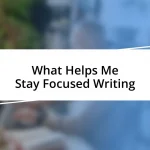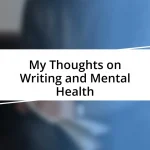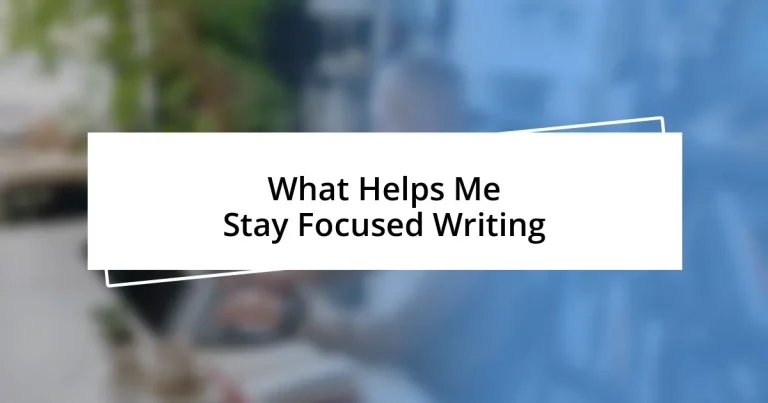Key takeaways:
- Focus in writing involves engaging deeply with the material and minimizing distractions through strategies like silencing notifications and creating a tidy workspace.
- Establishing a consistent writing routine with clear goals enhances productivity and fosters creativity, making writing a habit.
- Utilizing time management techniques, such as the Pomodoro Technique and task prioritization, helps maintain organization and mental clarity during writing sessions.
- Employing focus-enhancing tools like distraction-blocking apps and music can significantly improve concentration and creativity in writing.
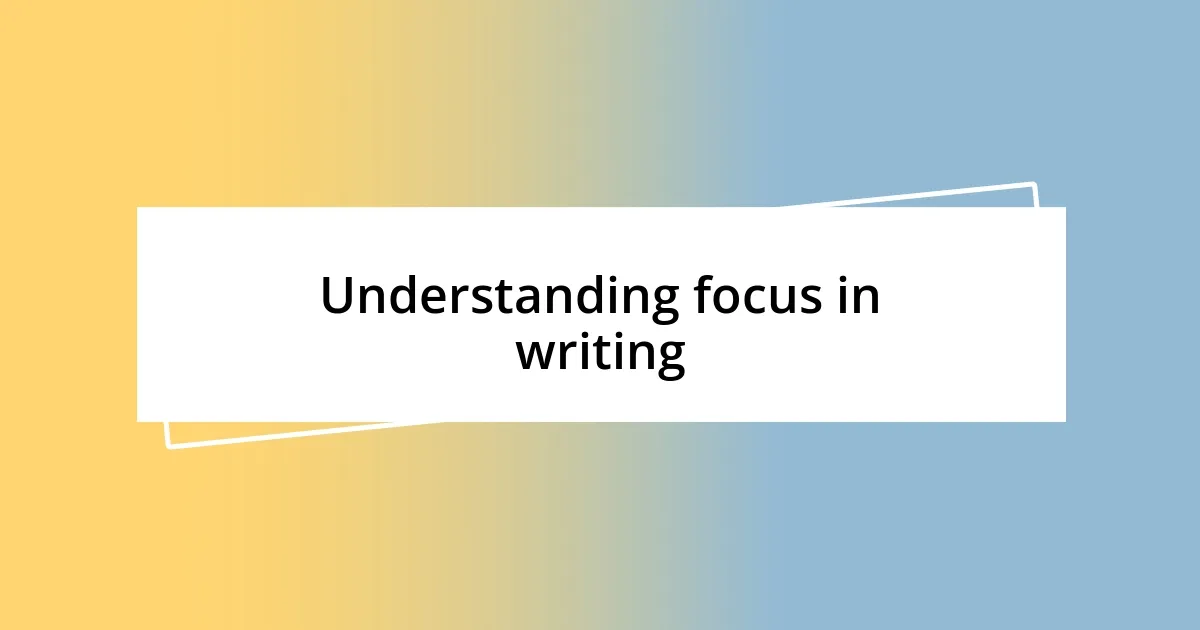
Understanding focus in writing
Focus in writing is like the steady beam of a flashlight in a dark room; it helps illuminate the path forward, directing our thoughts toward a clear and specific destination. I remember a time when I sat down to write an article, feeling overwhelmed by the countless ideas swirling in my mind. It was only when I tackled each idea one at a time that I truly honed in on my message. Have you ever felt that moment of clarity when you finally cut through the noise?
When I think about focus, it’s not just about avoiding distractions; it’s about engaging deeply with the material at hand. I’ve found that when I immerse myself in the topic, my passion naturally guides my writing. How many times have you discovered that writing flows more easily when you’re genuinely interested in what you’re saying?
Additionally, focus requires a conscious effort to shut out external influences. I’ve experimented with various strategies to minimize distractions, like silencing notifications or creating a dedicated workspace. It’s fascinating how even small changes can dramatically enhance my ability to concentrate. What strategies have you found effective in maintaining your focus while writing?
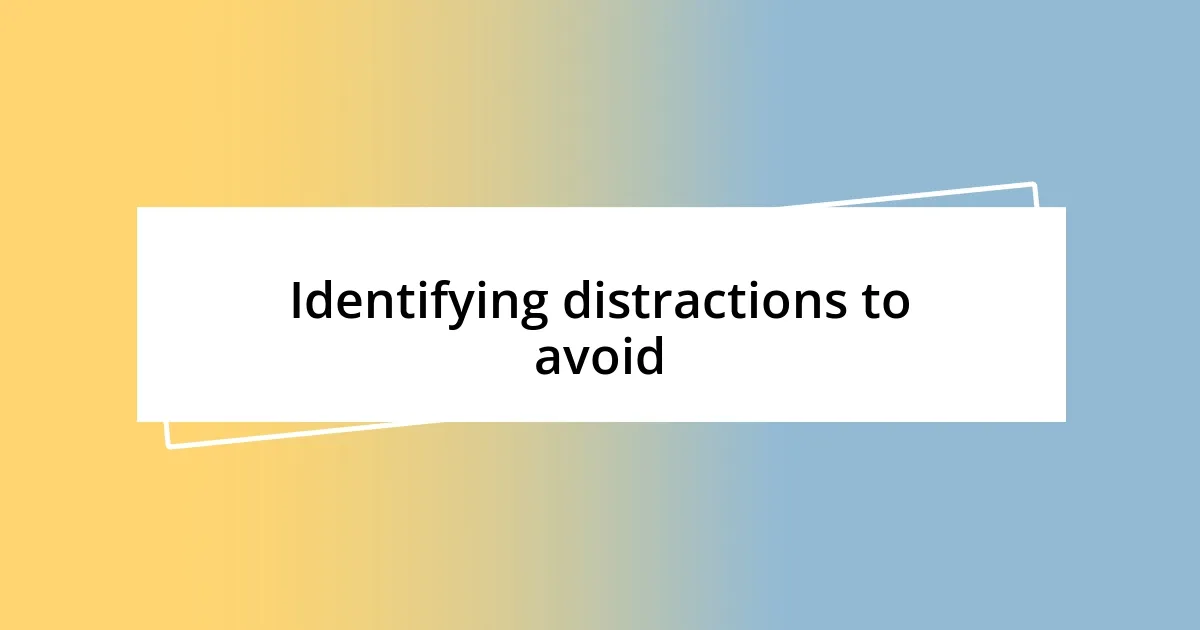
Identifying distractions to avoid
When I sit down to write, one of the first things that jumps out at me is the overwhelming presence of potential distractions. A ringing phone or a notification ping can easily pull my attention away from crafting that perfect sentence. In my case, I’ve noticed that social media notifications are particularly distracting; the allure of quick updates can derail my focus faster than I could imagine. Have you experienced the same temptation?
Another distraction I encounter is the environment around me. I’ve tried writing in various settings, and it’s clear that a messy, cluttered space tends to invite chaos into my mind. I remember attempting to write in a coffee shop where the chatter and clinking of cups had my mind wandering more than I would have liked. Setting up a calm, organized workspace has been a game changer for my concentration levels.
In addition, internal distractions can be just as challenging. I’ve noticed that racing thoughts about my to-do list often pop up while I write. Acknowledging these thoughts, then jotting them down quickly, helps me refocus on my writing. It’s a simple but effective trick that truly frees up my mental space. What internal distractions do you find most challenging?
| Type of Distraction | Impact |
|---|---|
| Social Media | Pulls attention away and can cause longer interruptions |
| Environment | Cluttered spaces create mental noise and hinder focus |
| Internal Thoughts | Can lead to loss of flow and increased anxiety if not managed |
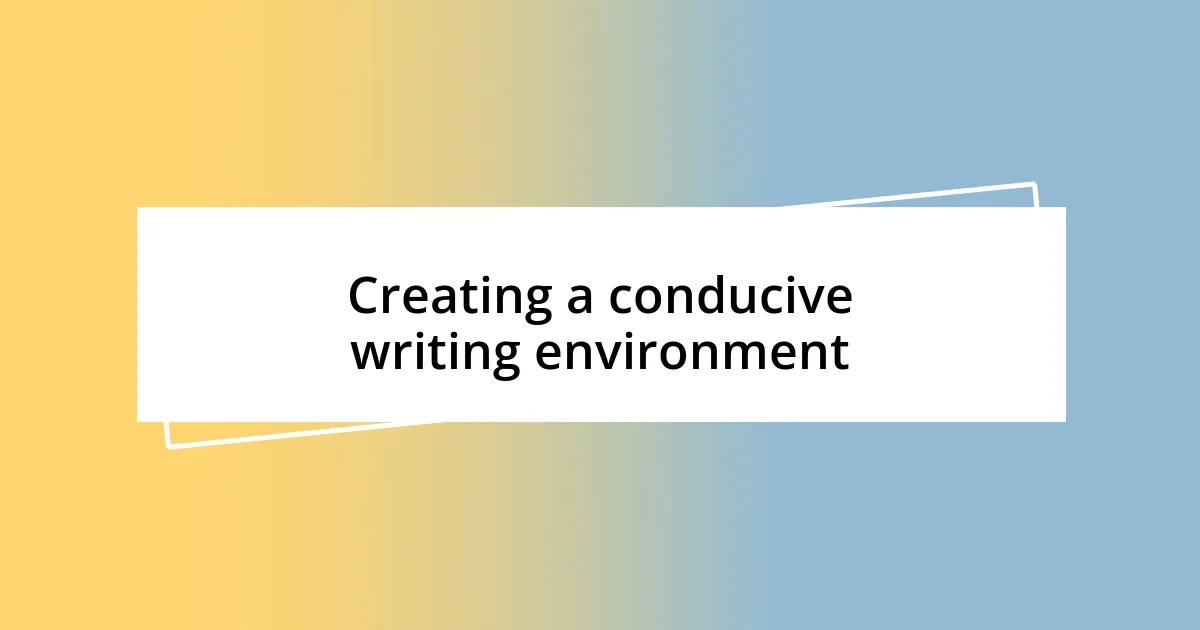
Creating a conducive writing environment
Creating a conducive writing environment is an essential step toward harnessing focus. I’ve found that the right setting significantly improves my ability to dive deep into my writing. For instance, I once transformed a corner of my bedroom into a cozy writing nook. Surrounding myself with plants, soft lighting, and my favorite books helped create a space where inspiration flowed freely. Do you have a special spot that sparks your creativity?
To optimize your writing environment, consider these elements:
- Low Noise Levels: Whether it’s a quiet room at home or a library, minimizing background noise can help you concentrate better.
- Comfortable Seating: A supportive chair ensures that physical discomfort doesn’t distract you from your writing.
- Personal Touches: Adding elements that inspire you, like art or quotes, can create a more inviting atmosphere.
- Clean Workspace: An organized desk prevents visual clutter that can pull your focus away from your thoughts.
- Tech Setup: Ensure all your devices are functioning smoothly to avoid annoying interruptions while you write.
When I apply these principles in my own space, I notice a remarkable shift in my ability to concentrate and create. It’s almost like setting the stage for a performance; when everything aligns, my words come to life effortlessly.
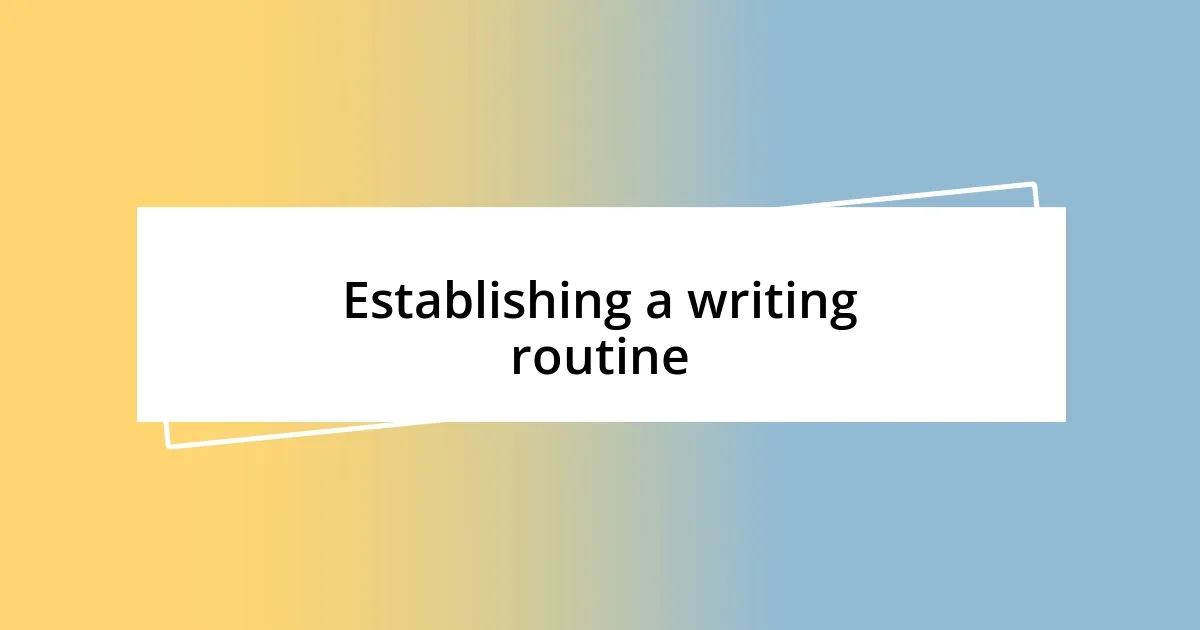
Establishing a writing routine
Establishing a writing routine has been a transformative experience for me. I’ve discovered that setting specific times to write each day fosters a sense of discipline and anticipation. For instance, when I started my morning with a dedicated half-hour of writing, I found that I was not only more productive but also more creative.
One key element of my routine is to define clear goals for each writing session. I often challenge myself to complete a certain number of words or pages. This goal-setting not only keeps me focused but also gives me that rewarding sense of accomplishment at the end. Have you tried setting goals for your writing? When I hit my targets, it feels like a mini-celebration!
Moreover, I’ve learned the importance of consistency. I aim to write at the same time each day, and over time, my brain has started to associate that time with creativity. There have been evenings when I’ve battled fatigue, yet pushing through those moments often leads to breakthroughs. It’s fascinating how a structured routine can turn writing into a habit that invigorates my day. What habits do you think could jumpstart your writing?
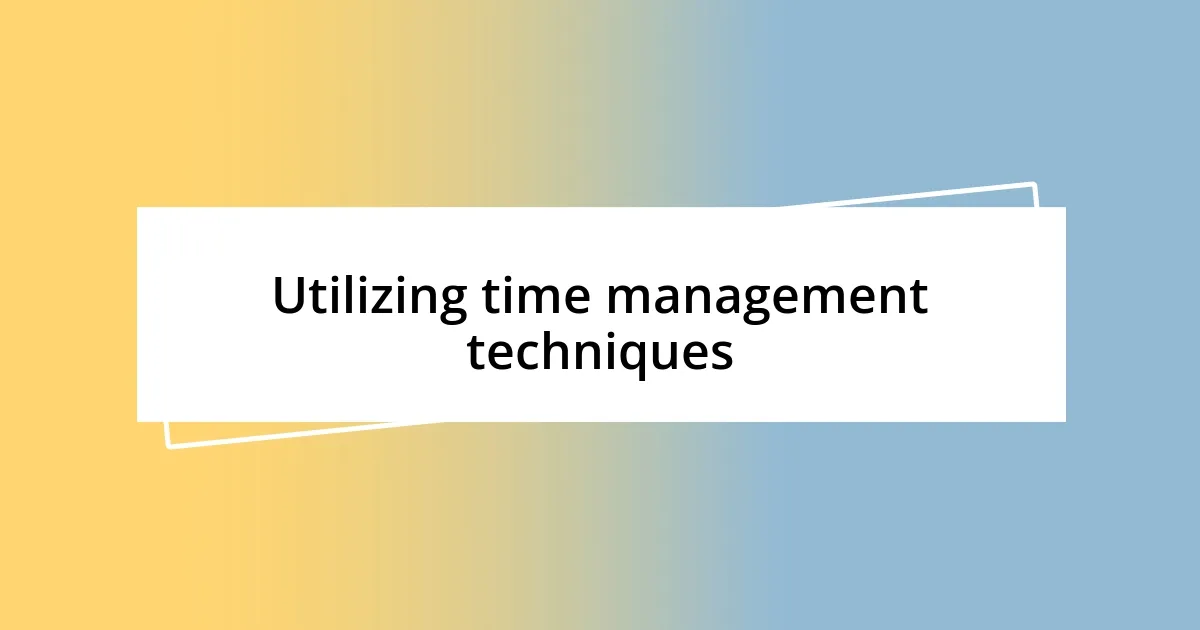
Utilizing time management techniques
Utilizing time management techniques has become a cornerstone of my writing process. I’ve experimented with various strategies, and one that stands out is the Pomodoro Technique, which involves 25 minutes of focused work followed by a 5-minute break. This method keeps my mind fresh and prevents burnout; I can genuinely feel how those small breaks rejuvenate my creativity. Have you ever noticed that stepping away can actually help you return with sharper focus?
Another technique that has worked wonders for me is prioritizing tasks through a simple to-do list. Each morning, I jot down what I aim to accomplish, focusing on the most substantial tasks first. It’s oddly satisfying to check off completed items; it provides a tangible sense of progress throughout my writing day. I used to overlook this simple task, but incorporating it into my routine has made a dramatic difference in staying organized and motivated. How do you prioritize your writing tasks?
Moreover, I deeply value time blocking; I designate specific hours for writing, editing, and brainstorming. When I set these boundaries, I can dive into each phase of writing without the nagging thought of what’s next. This clarity helps me stay in the moment, allowing for a more immersive experience in my creative process. Once, while tackling a tight deadline, I adapted my schedule to this method and found I could produce my best work under pressure without succumbing to anxiety. Have you tried time blocking? It might just elevate your writing experience!
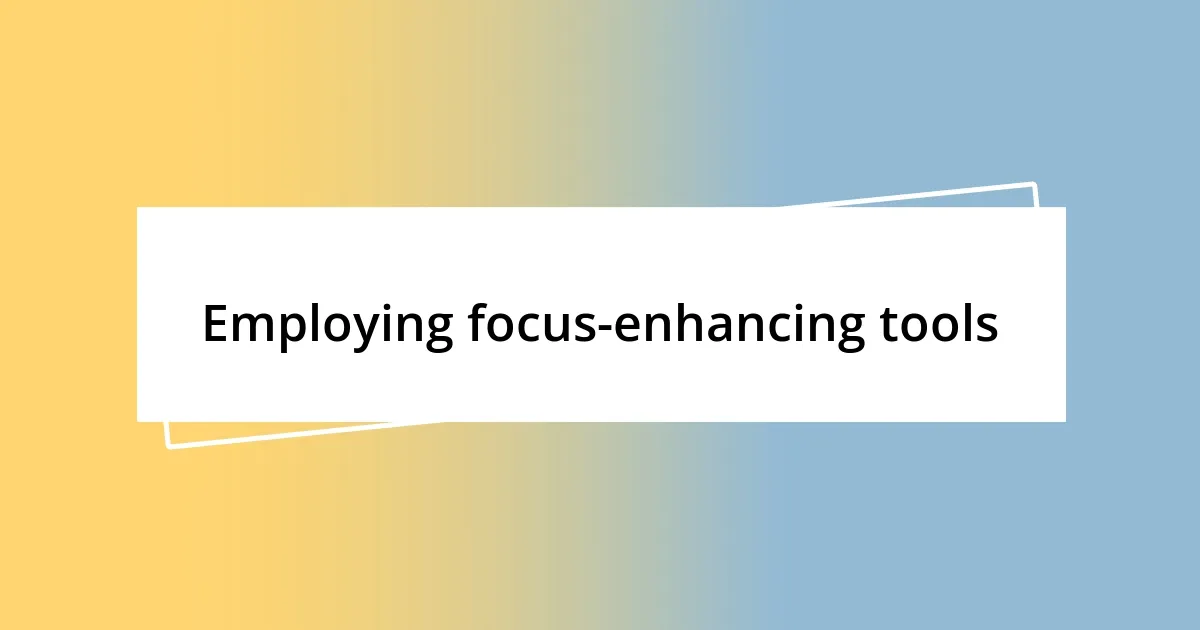
Employing focus-enhancing tools
Using focus-enhancing tools has been a game-changer for my writing sessions. One tool I absolutely swear by is the FOCUS@WILL app, which provides specially designed music that helps maintain concentration. I remember the first time I used it; I had headphones on, fully immersed, and after an hour, I realized I’d barely noticed the passage of time. It felt almost surreal to have such a flow state simply from changing the soundtrack of my writing environment. Have you tried using music or soundscapes to set the mood for your writing?
Another tool I often employ is a distraction-blocking app, like Freedom or Cold Turkey. These allow me to customize which websites or apps I can access during specific periods. Once, during a particularly challenging writing project, I activated the app and locked myself out of social media for two hours. It was tough at first, but I quickly found that without those distractions, my writing improved dramatically. Can you relate to the struggle of resisting the endless scroll?
Lastly, I’ve discovered the power of visual aids, such as mind maps or vision boards. I often create visual representations of my ideas before diving into writing. This helps me clarify my thoughts and keeps my creative energy flowing. Just last week, as I brainstormed for a new article, I sketched out my concepts on a large poster. The visual engagement sparked so much inspiration that I ended up drafting multiple pieces in one sitting. Have you ever considered how visuals can help unlock your creativity?
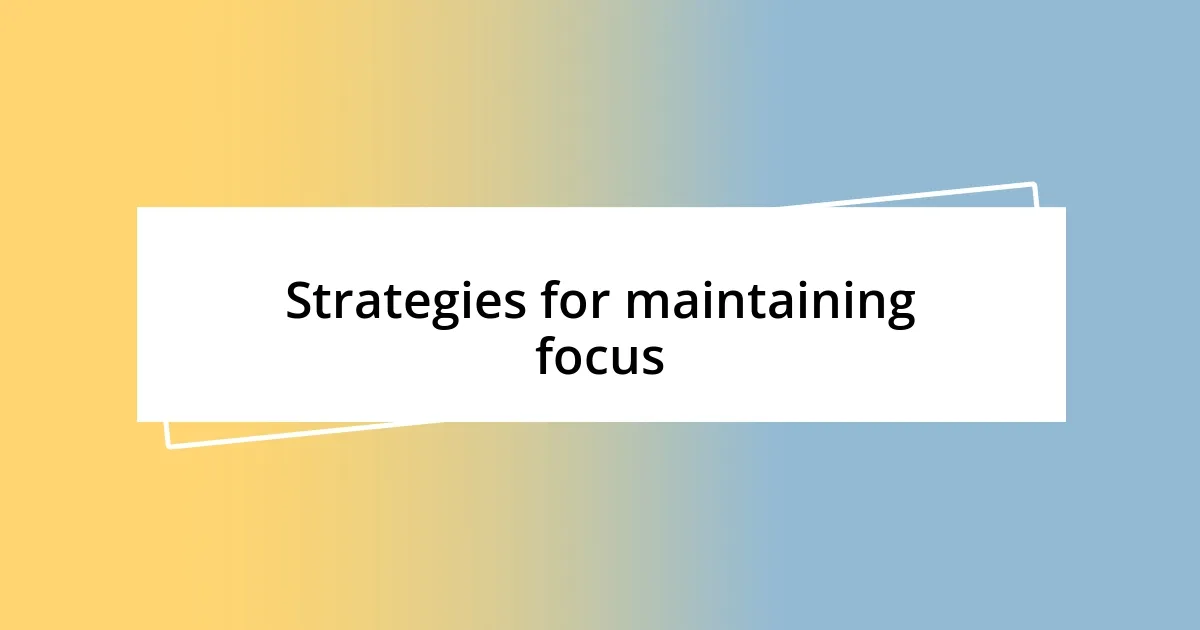
Strategies for maintaining focus
Finding the right atmosphere plays a huge role in staying focused while writing. For me, this means turning off any unnecessary notifications and creating a dedicated workspace. I vividly remember a time when I set up a cozy nook in my living room, devoid of distractions. The difference was palpable; I was amazed at how my mind shifted from chaos to clarity. Have you ever experienced the transformation that comes from simply redesigning your workspace?
In addition to environment control, I’ve found that setting clear intentions for each writing session keeps me focused. Before I start, I mentally outline what I hope to achieve. By doing this, I tap into a sense of purpose that propels me forward. There have been days when I simply wrote “Today, I will write 1,000 words” and nailed it. It’s like giving myself a mini-challenge, and I can feel that excitement building. Isn’t it interesting how defining a goal can energize your approach?
Another strategy I cherish is the practice of mindfulness techniques. Whenever I feel my focus wavering, I take a minute to close my eyes and take deep breaths, centering myself. This brief pause reconnects me to the task at hand and quiets the noise in my mind. I remember a particularly hectic day when a few minutes of focused breathing transformed my writing session. It was as if I had flipped a switch; my ideas flowed seamlessly afterward. Have you tried incorporating mindfulness into your writing routine? It could be the key to enhancing your concentration.







